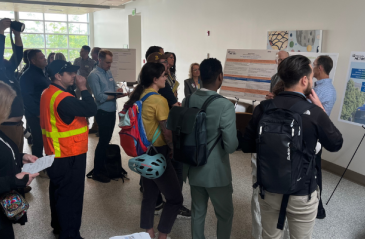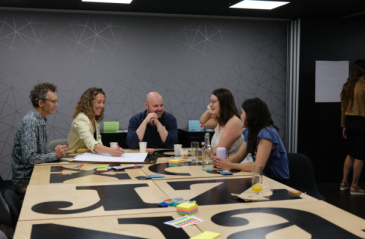
The information barriers holding back climate action and how to break them

Helping youth become leading innovators is the mission of @JanetLongmore and @DigitalOppTrust
Share articleConnecting young digital talent with demand in communities has huge impact across society
Share articleDigital skills and social innovation are priorities for @JanetLongmore and @DigitalOppTrust
Share articleWe put our vision for government into practice through learning partner projects that align with our values and help reimagine government so that it works for everyone.
Fifteen years ago, Janet Longmore had a simple but powerful idea.
She was at home in Ottawa - but her heart was in Africa and in developing nations elsewhere. These countries faced a burgeoning demographic dividend of young workers but didn't have enough jobs available for them, while there were communities of older workers keen to embrace the digital revolution without the essential skills to do so. The solution, she felt, was to connect the two.
"Hundreds of thousands of talented young people were graduating into unemployment," she points out. "They were tech-savvy and early adopters. And then on the other side there were, and are, communities who want to get on board and learn new digital skills and digital literacy. The idea was to mobilise these university and college graduates and then match them with the demand at the community level for people to learn new digital skills. So we were trying to turn their digital capacity into their livelihoods."
Today, the international not-for-profit organisation she founded, Digital Opportunity Trust (DOT), has mobilised the talent and energy of over 6,000 tech-savvy young people worldwide, reached a million people in communities and schools, and worked in 24 countries from 8 DOT offices in the Middle East and sub-Saharan Africa. Quite a story. So, how did she do it?
Longmore - whose passion for her work comes through loud and clear in every sentence - says that DOT's growth has rested largely on its mobilisation of local resources. This was sensible not only because of Canada's geographic position but also because it allowed a sense of local ownership to take firm root straight away. From its starting point in Jordan, and fuelled by donor and philanthropic funds, DOT moved steadily across the Middle East to Lebanon and Egypt before turning its compass south towards an array of countries in Africa.
"What we are trying to do is ensure that young people can connect their ideas to opportunities in their community, ensuring communities are socially and economically productive," she explains. "Our networks of young leaders - who we originally christened ‘DOT Interns' - stay with us for nine months and are in their 20s. They come to us from college or university and are from, or familiar with, the communities where we implement our programmes. In return, we help build their leadership and facilitation skills and, after their internship is up, they can enter the workforce as talented, experienced and in-demand professionals."
DOT's young leaders offer a range of services, primarily focused on education and economic issues. For example, its leadership programme trains young university graduates to deliver technology, business and workforce readiness skills in communities that are developing under stress or in transition. By contrast, its education sector programme places young university graduates in schools to guide and assist teachers with integrating technology into their classrooms.
"Our young leaders become change agents, mentors, and role models," says Longmore. "And because they are delivering our services in communities that they are personally familiar with, they really are able to connect with the local young people, women, and business owners we want to reach. These are often their neighbours, friends and family. And because they know them so well, they can ensure that the people who need it most are benefiting the most."
Another priority - from day one - has been to ensure that women do not miss out on DOT's services. "We have always sought to engage at least 50% women as interns and young leaders and they, in turn, will impact at least 50% women in these communities," explains Longmore. "This has happened and, of course, they have been incredible role models for using digital technology."
That said, it is also clear there is much still to do. "Endless statistics show that women are less connected than men, and it has actually got worse on the African continent," she adds. Asked why this is the case, she says it is down to myriad factors.
"Safety and security is a big explanation, as they are vulnerable to being harassed online. There are cultural reasons too - not being able to 'own' their device. But with four billion people connected to the internet, what we advocate isn't just about women participating but appointing them into leadership positions and having them create the new system that is needed. They need to shape it and own it themselves - and have faith in their capacity to do so."
Longmore and her colleagues have also sought to build extensive bridges with policymakers. Their success, however, has not been universal. Often they have come up against a brick wall in the shape of an impenetrable bureaucracy. "Without strong ministerial leadership, governments can be difficult places to navigate," she concedes. "Silos often spring up, and there isn't enough integration between different ministries. This means that, in many cases, it is the donor world rather than government that is funding us to deliver local services to the people - which is a real shame."
There are some bright spots, however. Rwanda, for example, is moving forward at a rate of knots, thanks to strong backing from President Kagame and his government. "Rwanda has a lot of the necessary conditions for growth, in that it is a small country with a very strong digital agenda and leadership support - they actually have a Ministry of Youth and ICT - how cool is that? Rwanda is also seeking to extend ‘Internet for All' under a programme backed by the World Economic Forum that will reach five million of its citizens. And Jordan, too, is making strong progress. King Abdullah said we need to change the mindset from the 'Internet of Things' to the 'Internet of Humanity' - which really struck a chord with me."
After fifteen years of helping empower people to recognise the digital opportunities around them and strengthen local economies, Longmore would be forgiven for taking a breather, but that's not on the agenda any time soon. DOT's priorities going forward are "skills, digital literacy, social innovation - because that's what young people are telling us they are passionate about", and these will influence and guide its current and future operations.
"The pace of digital change is so fast, so we need to focus on skills and self-empowerment - that ability to self-direct your learning and connect with others," she explains. "It comes down to the behaviour of how you use technology and how they can figure out what works for them. This is what we are driving."
But looking further ahead - say, another fifteen years - and Longmore quickly says that she hopes that DOT and its work will no longer be necessary. "I would like us to be embracing an Internet of Humanity, where young people will have a basic right to self-directed education and be able to connect and work," she concludes. "I also believe young people will drive these changes - they are not going to stop. And fifteen years out, if we don't have women engaged as leaders we will have missed a huge opportunity."
These are big ambitions, but Longmore makes no excuse for aiming high - and rightly so. And certainly, if the past fifteen years serve as our guide to the future, the odds are that this vision may well become reality sooner than anyone expects.












